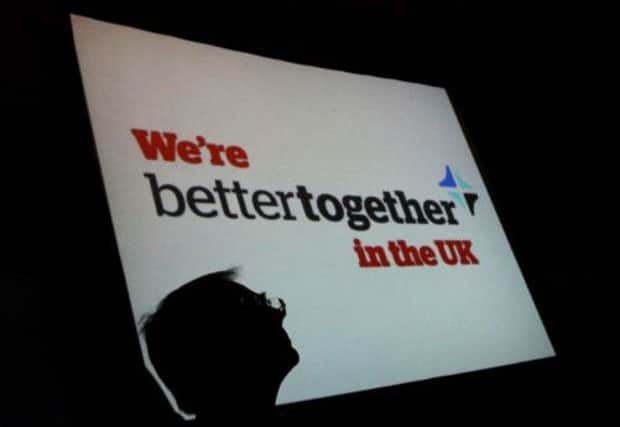Leaders: No campaign has to raise its game


Now he has warned there is a crisis within unionist politics in Scotland, which could result in Alex Salmond overturning the independence campaign’s poll deficit and winning next year.
Unionist leaders may be tempted to disregard Mr McLeish as an embittered spectre, striving to find a space in the political arena from which he evicted himself following inept handling of an expenses scandal. They should resist the temptation and listen to at least some of what he says.
Advertisement
Hide AdAdvertisement
Hide AdMr McLeish’s argument picks up on comments by Nate Silver, a noted American statistical analyst of political polling who thinks it highly improbable that the Yes campaign will win. Mr Silver entered an important caveat – that if there was some game-changing event south of the Border, Scots could review their thinking.
Writing in this newspaper today, Mr McLeish reckons that an increasingly divided Britain, where intolerance and unfairness come to dominate politics south of the Border and the southern electorate becomes consumed by greed and inequality, could well be the factor that changes the game. His evidence is the rise of anti-EU and anti-immigration Ukip and of far-right parties in England, a phenomenon which has no counterpart in Scotland. This, he says, could well cause many Scots to turn their backs on the Union, as could the negativity of the pro-Union Better Together campaign, which he believes is failing to connect with Scots.
Two criticisms can be made of this analysis. If the No campaign is failing to connect, it is odd that it is about 20 percentage points ahead of the Yes campaign. And the Scottish electorate, various social science surveys have shown, may be a more socially liberal and economically leftist than voters south of the Border, but the difference is not as great as is often thought. The second point will be put to the test more in the European parliamentary elections due next spring. If they reveal a bigger gulf in political attitudes on either side of the Border, Mr McLeish may well have a point.
Where he is on sounder ground, however, is in pointing out that the pro-Union campaign has been led so far by the UK government publishing a series of papers which Mr McLeish dramatises as claiming Scots will face “endless threats of famine, pestilence, plague and aliens if they dared vote for independence”.
It is true that little by way of the positive vision for the future of Scotland in the Union has yet to be made. So, if we are hit by some unforeseen political shock and the SNP is alone in presenting a way ahead, Mr McLeish may well be seen as having a point.
Whether he is ultimately proved right or wrong, his article today at least throws down the gauntlet to unionists to up their game ahead of next year’s referendum.
Unwarranted abuse of power
Any journalist who writes stories based on leaked secret intelligence documents must expect to become the target of unwelcome security service investigations. But for this to lead to friends and relatives becoming regarded as potential terrorist threats is quite monstrous.
This seems to be the implication of the detention at Heathrow of David Miranda while in transit from Berlin to Rio de Janeiro, where he lives with his partner, Glenn Greenwald. Mr Greenwald and, to some extent, Mr Miranda have been doing work for the Guardian on the US intelligence files leaked by whistleblower Edward Snowden.
Advertisement
Hide AdAdvertisement
Hide AdMr Miranda was held and questioned under Section 7 of the Terrorism Act 2000, which allows British police to stop, search, and question anyone they like (or dislike) without the need to show reasonable suspicion they might be involved in, or know something about, acts of terrorism. Even the right to silence is extinguished because failure to answer questions can be regarded as obstructing behaviour, punishable by up to three months in jail.
According to Mr Miranda, he was questioned by up to six agents who took away his laptop, mobile phone and memory cards. Like Mr Greenwald, he regards this as totally unwarranted intimidation aimed at getting them to stop embarrassing the agencies and their governments.
Intelligence services have a difficult job to do in combating terrorism. But keeping civilians safe from bombs does not justify using the legal tools they have been given to threaten civilians. The liberties and freedoms, including freedom of the media, which these agencies are supposed to protect have been reduced by this abuse of power.